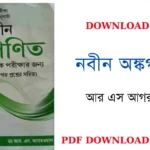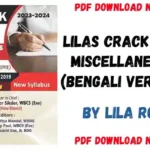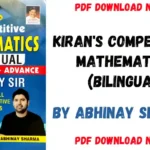M. Laxmikanth Indian Polity Download PDF
M. Laxmikant’s “Indian Polity” is widely considered a must-read for aspirants preparing for competitive exams like the UPSC Civil Services Examination, State Public Service Commissions, and other examinations testing knowledge of Indian political and constitutional issues. Here’s why it’s so beneficial:
Comprehensive Coverage:
- The book covers the entire spectrum of Indian polity, including the Constitution, government structure, fundamental rights, judiciary, electoral system, local government, and center-state relations.
- It also delves into key amendments, landmark judgments, and current political issues.
Structured Learning:
- The book is well-organized, with each chapter divided into subtopics and further explained through flowcharts, diagrams, and tables for better understanding and retention.
- This structure makes it easy to navigate through the vast amount of information and focus on specific areas.
Clear and Concise Writing:
- Laxmikant’s writing style is known for its clarity and conciseness. He presents complex concepts in a way that is easy to understand, even for those without prior knowledge of the subject.
- This makes the book accessible to a wide range of readers.
Emphasis on Application:
- The book goes beyond just providing information. It also helps readers apply their knowledge by including solved questions from previous examinations and practice questions at the end of each chapter.
- This helps in identifying areas of weakness and preparing effectively for the exam format.
Regular Updates:
- The book is regularly updated to reflect the latest changes in the Constitution, laws, and political landscape. This ensures that readers have access to accurate and up-to-date information.
Wide Acceptance:
- “Indian Polity” is widely recommended by teachers, coaches, and successful candidates. This consensus endorsement speaks to the book’s effectiveness in preparing aspirants for competitive exams.
However, it’s important to note that:
- The book is voluminous and requires dedicated effort to read and understand thoroughly.
- It is primarily focused on competitive exams and may not be as suitable for those seeking a general understanding of Indian polity.
- [PDF] নবীন অঙ্কগণিত আর এস আগরওয়াল |Nabin Onkoganit RS Aggarwal
- [PDF] Lilas CRACK PSC MISCELLANEOUS | Lilas PSC Miscellaneous syllabus
- [PDF] Kiran’s Competitive Mathematics | Abhinay Sharma Mathematics (Bilingual)
- [PDF] SSC Reasoning | Mastering SSC Reasoning
- [PDF] Nitin Singhania: WBCS General Studies Manual | নিতিন সিংহানিয়া: ডব্লিউবিসিএস জেনারেল স্টাডিজ ম্যানুয়াল
Contents- Indian Polity M. Laxmikanth
| Part | Chapters | Topics Covered |
|---|---|---|
| I: Introduction to the Constitution | 1. Introduction | Making of the Constitution, Features of the Constitution, Salient Provisions of the Constitution |
| 2. The Preamble | Objectives, Fundamental Rights, Directive Principles, Fundamental Duties | |
| 3. Fundamental Rights | Right to Equality, Right to Freedom, Right against Exploitation, Right to Freedom of Religion, Cultural and Educational Rights, Right to Constitutional Remedies | |
| 4. Directive Principles | Nature and Significance, Implementation | |
| 5. Fundamental Duties | Introduction, Content | |
| 6. Amendment of the Constitution | Power to Amend, Procedure for Amendment, Limitations on Amendment | |
| II: The Union | 7. The Union and its Territory | Historical Background, States and Union Territories, Citizenship |
| 8. President | Election, Powers and Functions, Impeachment | |
| 9. Vice-President | Election, Powers and Functions | |
| 10. Prime Minister and Council of Ministers | Appointment, Powers and Functions | |
| 11. Parliament | Composition, Powers and Functions | |
| 12. Lok Sabha | Composition, Powers and Functions | |
| 13. Rajya Sabha | Composition, Powers and Functions | |
| 14. Legislative Procedure | Introduction of Bill, Passage of Bill, Assent of the President | |
| 15. Finance | Finance Commission, Union Budget, Public Debt | |
| III: The States | 16. Governor | Appointment, Powers and Functions |
| 17. Chief Minister and Council of Ministers | Appointment, Powers and Functions | |
| 18. State Legislature | Composition, Powers and Functions | |
| 19. Vidhan Sabha | Composition, Powers and Functions | |
| 20. Vidhan Parishad | Composition, Powers and Functions | |
| 21. Legislative Procedure in States | Introduction of Bill, Passage of Bill, Assent of the Governor | |
| 22. Finance in States | State Finance Commission, State Budget | |
| IV: Local Government | 23. Panchayati Raj | Introduction, Constitutional Provisions, Three-Tier System, Panchayats at Village, Block and District Levels |
| 24. Municipalities | Introduction, Constitutional Provisions, Types of Municipalities, Municipal Councils | |
| V: Election Commission | 25. Election Commission | Composition, Powers and Functions |
| 26. Electoral System | Franchise, Types of Elections, Election Process | |
| VI: The Legislature | 27. Parliamentary Privileges | Powers, Privileges and Immunities of Parliament and Members of Parliament |
| 28. Delegation of Legislation | Subordinate Legislation, Types of Delegated Legislation, Judicial Control over Delegated Legislation | |
| VII: The Executive | 29. President in Council | Powers and Functions Exercised by the President on Advice of Council of Ministers |
| 30. Attorney General | Appointment, Powers and Functions | |
| 31. Comptroller and Auditor General | Appointment, Powers and Functions | |
| 32. Union Public Service Commission | Appointment, Powers and Functions | |
| 33. State Public Service Commissions | Appointment, Powers and Functions | |
| VIII: The Judiciary | 34. Supreme Court | Composition, Jurisdiction, Powers and Functions |
| 35. High Courts | Composition, Jurisdiction, Powers and Functions | |
| 36. Subordinate Courts | District Courts, Subordinate Courts | |
| 37. Judicial Review | Meaning, Scope, Grounds of Judicial Review | |
| 38. Independence of Judiciary | Meaning, Importance, Safeguards |
- Mission Shakti Recruitment 2024: Apply for 127 Vacancies in Creche Worker & Helper
- NBU Recruitment 2024: Apply for Research Assistant and Field Investigator Positions
- How to Apply for the Sainik School Admission Test (AISSEE) 2024: A Complete Guide
- India’s Top Education Loans for Undergraduate and Postgraduate Students
- AIIMS Mangalagiri Recruitment 2024: Apply for Project Technical Support Role
Read Offline-Indian Polity M. Laxmikanth
Indian Polity M. Laxmikanth PDF Free Download
| Title: | Indian Polity |
| Author: | M. Laxmikanth |
| Language: | English |
| Place & Publication: | Chennai |
| Publisher: | McGraw Hill Education (India) Private Limited |
| PDF – Download Link | Click Here |
| Buy : | Amazon |
FAQs
- Who is M. Laxmikanth?
- M. Laxmikanth is an author and educator known for his book “Indian Polity: A Comprehensive Study of Indian Constitution and Governance.” He has written several books on Indian governance and politics.
- What is the main focus of the book “Indian Polity”?
- The book primarily focuses on providing a comprehensive study of the Indian Constitution and the governance structure of India. It covers various aspects of Indian polity, including constitutional provisions, government institutions, and political processes.
- Which exams is “Indian Polity” by M. Laxmikanth useful for?
- The book is particularly useful for aspirants preparing for competitive exams in India, such as the Civil Services Examination (IAS, IPS, IFS), State Civil Services, and other government recruitment exams where knowledge of the Indian political system is essential.
- Is the book suitable for beginners in the field of Indian polity?
- Yes, “Indian Polity” by M. Laxmikanth is considered suitable for beginners as it provides a detailed yet accessible explanation of the various concepts related to Indian governance. The language used in the book is generally easy to understand.
- Does the book cover the latest amendments to the Indian Constitution?
- Yes, the book is updated to include the latest amendments to the Indian Constitution. It strives to provide the most recent and relevant information about the constitutional changes and developments.
- Are there practice questions in the book?
- Yes, the book includes practice questions at the end of each chapter, allowing readers to test their understanding of the concepts covered. This feature is particularly helpful for exam preparation.
- Is “Indian Polity” by M. Laxmikanth available in multiple languages?
- The book is primarily available in English, which is the language commonly used in competitive exams in India. However, there may be translations available in other languages.
- Can the book be used for academic studies or is it mainly for exam preparation?
- While the book is widely used for exam preparation, its detailed coverage and systematic presentation make it a valuable resource for anyone seeking a thorough understanding of the Indian political system, including students studying political science or related subjects.
- Where can I purchase “Indian Polity” by M. Laxmikanth?
- The book is available at major bookstores and online platforms. It can be purchased through online retailers or at local bookshops.
- Is the book suitable for state-specific exams, or is it more focused on national-level exams?
- “Indian Polity” by M. Laxmikanth covers aspects of both national and state-level governance. While it is a valuable resource for national-level exams like the UPSC Civil Services Examination, it also includes information relevant to state-level exams. However, candidates preparing for state-specific exams may also need to refer to additional materials focusing on state-level governance.















